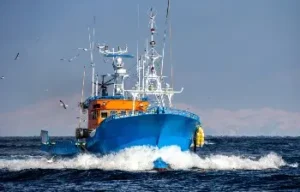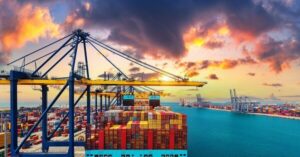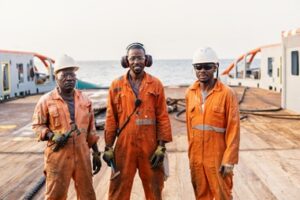Unfortunately, not everyone working in Louisiana’s maritime industry has access to workers’ compensation. If you’re injured on the job, you may need to fight for the compensation you deserve. Our Louisiana maritime injury lawyers have helped longshoremen, harbor workers, crew members, and other maritime workers make their voices heard.
You can count on Scott Vicknair Injury Lawyers to help you demystify the Death on the High Seas Act (DOSHA), the Jones Act, the Longshore and Harbor Workers’ Compensation Act (LHWCA), and the Outer Continental Shelf Lands Act.
You can get in touch with our Louisiana personal injury lawyers today to discuss how these laws allow you to recover from maritime accidents. We’ve secured over $100 million on behalf of maritime workers and are ready to work for you.
Maritime Laws Protect Your Right to Recover from Catastrophic Injuries
Serious accidents offshore can leave you and your coworkers unable to work for weeks, if not months, at a time. Unfortunately, corporations can get around paying you the workers’ compensation you need to treat broken bones, traumatic brain injuries, and other losses. That is where maritime laws come into play.
An experienced maritime attorney in Louisiana can break down the laws relevant to your recent injury and discuss how they allow you to file compensation claims. Those claims may bring your losses to the attention of the local government, federal government, or relevant insurance companies, allowing you to get the financial support you need to pay your medical bills.
The laws our team finds most relevant to maritime injury claims include the following:
Death on the High Seas Act
The Death on the High Seas Act, 46 U.S.C. § 30301 et seq., is an admiralty law focusing on wrongful deaths that provides a cause of action for family members who lose a loved one because of a disaster or negligence in international waters.
Many people associate the high seas with boating, but oil rig workers may also be in international waters. An oil rig explosion or other disaster could lead to a cause of action under this law, which a Louisiana maritime injury attorney could explain further. Some survivors may be able to bring claims under both the DOHSA and the Jones Act.
The Jones Act
The Jones Act prevents foreign-flagged ships from transporting cargo between particular U.S. ports. It also creates a cause of action for U.S. sailors and offshore oil rig workers who are injured at sea. Sailors who suffer personal injuries have the right to bring claims of negligence against ship owners, and these rights go beyond the rights of international maritime law.
The basics of the Jones Act cover one of the biggest questions: whether the employee qualifies as a seaman or sailor. Under judicial interpretations of the Jones Act, a person who spends less than 30 percent of their time in service on a vessel in navigable waters is not a seaman.
A benefit of the Jones Act is that the injured person or a survivor’s family can bring suit in either state or federal court. A Louisiana attorney who handles maritime law could provide advice about which court is more appropriate for someone’s claim.
Longshore and Harbor Workers’ Compensation Act
The Longshore and Harbor Workers’ Compensation Act, 33 U.S.C. § 901 et seq., provides workers’ compensation coverage for those employed on or near navigable waters in jobs directly related to the function of the harbor, such as loading, unloading, building, or repairing a vessel. The compensation is in lieu of Louisiana state workers’ compensation coverage.
An injured worker does not have to be on navigable waters at the time of the accident, but they must be engaged in maritime employment that is integral to a harbor’s function and spend most of their time on or near the navigable waters, which means some workers, like clerks, cashiers, or restaurant workers, are not covered.
Anyone who is uncertain whether workers’ compensation or the LHWCA covers their injuries should consult a maritime injury lawyer in Louisiana.
Outer Continental Shelf Lands Act
The Outer Continental Shelf Lands Act, 43 U.S.C. § 1331, extends LHWCA protections to people who are working to explore or develop natural resources on the outer continental shelf. It fills the gaps for workers who may not otherwise have coverage under the Jones Act or the LHWCA.
A Louisiana maritime injury lawyer could examine the location of the accident and the nature of a person’s employment to determine whether this law applies.
Injured on Someone Else’s Property?
Know Your RightsOur expert premises liability lawyers will help you hold negligent property owners accountable.
Get a Free Case Evaluation
504-500-1111When to Contact an Offshore Injury Attorney in Louisiana
Medical expenses can pile up quickly after a maritime accident. You deserve representation as soon as you get back on shore, if not sooner. Fortunately, our legal team makes it easy for you to get in touch with a Louisiana maritime injury attorney who will take your losses seriously. You can book a free case evaluation with our staff members online or by phone.
We want maritime workers to retain their right to legal action even in the face of countless doctors’ appointments. That’s why our team prioritizes your right to file before time limitations for maritime workers expire.
We can manage an investigation into a vessel owner’s negligence – or negligence from another party – as well as the calculations needed to determine the value of your financial compensation.
Contingency Fees and Maritime Representation
We offer all of these services on a contingency fee basis. You do not have to pay a dime upfront to benefit from our representation. It doesn’t matter whether you’re filing an insurance claim or preparing to take the parties responsible for your losses to court – we don‘t get paid unless we win your case.
Louisiana Maritime Injury Lawyers Make Claims Based on Evidence
Your legal right to bring an injury claim to the attention of a civil court depends on your ability to prove that a particular party, be that an employer or vessel owner, violated the duty of care they owed you. Our Louisiana maritime injury lawyers help you prove your point by gathering the hard data needed to make your case.
We do not make survivors in your position confront negligent parties or gather evidence yourselves. Instead, after your legal consultation, we can connect with professional investigators to analyze the following:
- Video footage of your accident
- Statements from your coworkers and other witnesses
- Expert witness testimony relevant to your case
- Electronic data from oil rig equipment, ships’ black boxes, and other sources
- Photos from before and after your accident
- Workplace damage and physical debris
- Medical reports going into detail about your injuries
A comprehensive investigation ensures that an offshore injury lawyer can request compensation benefits that fully encompass the value of your losses.
Harmed by a Dangerous Defective Product?
We’re Here for YouOur experienced product liability attorneys will fight to secure the compensation you deserve for your injuries.
Schedule a Free Consultation
504-500-1111Consult a Maritime Injury Attorney in Louisiana
Louisiana’s maritime laws strive to protect dockworkers, sailors, seamen, oil rig workers, longshoremen, and other offshore workers from maritime accidents. These same laws give these parties the right to take legal action in the wake of an offshore accident.
Anyone injured in an offshore accident can connect with maritime lawyers in Louisiana to discuss how to pursue a recovery claim under these laws. Scott Vicknair Injury Lawyers take your losses seriously. We want to connect you with Louisiana maritime injury attorneys who can represent you in a fight for the benefits you deserve.
If you’re ready to file a maritime claim, schedule a free and confidential consultation with our law firm today. We’re prepared to use our legal experience to help you secure the fair compensation you deserve.


